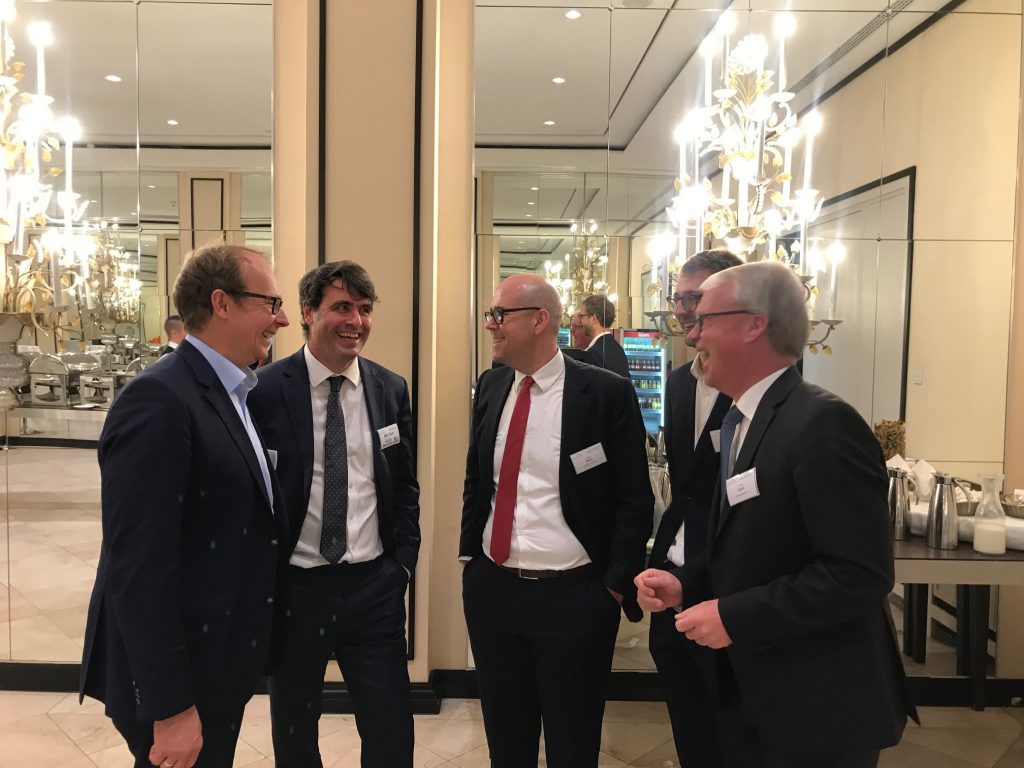
SSNIPpets (36): Close of business
Christmas trees are close to be lit, December cookies have to be eaten before being too hard, time for last minute gift shopping is running out, and the essential question for the antitrust lawyer is which merger case you still have to get through in 2019 or which damage claims you still have to file by the end of the month. This newsletter provides important information on this – it is most probably the last one this year. Before close of business, here are Rupprecht Podszun’s SSNIPpets for you – small but significant news, information and pleasantries, our pet project.
Turn(er)ing point?
Let’s start on a thoughtful note, because it fits into the contemplative times of this time of the year. Is competition a good thing? The Turner Prize shed some light on this. It is, as you surely know, the most important competition in the arts in the UK. For several weeks, the works of a few selected artists are on display, and a jury then awards the Turner Prize to one of them. This year, however, the four nominated artists were not made from the sterner stuff of standing in competition and they announced in a statement that they would share the prize, and thus asked the jury not to announce a winner (who takes it all). Their art, so they claimed, is “incompatible with the competition format which has a tendency to divide and individualize,” German magazine Spiegel quoted the artists (I did not find it so blatantly in the original English wording, but whatever!). Since they refused to play according the rules of competition I do not mention the names of these artists here (tit for tat)!
So, what did the jury do? It followed this anti-competitive stance with enthusiasm! Four winners instead of one, great harmony instead of competition. Where does that leave consumer welfare, efficiency, innovation?
With this attack on competition from the arts, it is reassuring to know that Berlin-based TV producer Jason Laming at least confirmed in the December interview I did with him for German competition law journal WuW that competition still works well on TV shows like “The Great British Baking Show”, “The Voice” or “Dancing with the stars”. According to Jason:
“Our aim is to find the right framework for a show so we maximise exciting things happening. We strive for this with the right setting, the rules of the game and also through competitive elements. Competition is the perfect driver for such a show since it generates pressure. If people are under pressure we really get to know them. And with each episode we get a better understanding of what makes the protagonist betrays his peers on Survivor.”
Number Plates
The German Federal Cartel Office (Bundeskartellamt) is not in holiday mood. On 23 December 2019 a press release was issued that the embossers of number plates were fined eight million Euros. They restricted competition! The fine will go down well with everyone (!) who ever had to get a number plate in Germany in the, say, past 112 years, i.e. since the introduction of the license plate requirement for cars in Germany. It is an incredible rip-off, and now we know why. Please let your engine roar for a second (just a second, Greta Thunberg!) And then, let’s move full speed to damage claims!

Steel
The Bundeskartellamt’s Working Group on Competition Economics also met. That is a small kind of professors’ conference (just like the big one each year in October, but with economists only). It’s a very small conference indeed: according to the press release there were 4 (in words: four) academic participants – all male (I will get back to that issue later). The other economists probably didn’t have time, as they were still busy turning down requests for expert opinions in damages proceedings… Topics discussed by the foursome and their counterparts from the Bundeskartellamt: raising rivals’ costs through mergers, algorithms and extensive data collection and exploitation.

Not on the agenda: the level of fines. The occasion would have been a good one. With a fine of 646 million € imposed on steel manufacturers for agreements on quarto plates, the Office hit a new record high. According to the Bundeskartellamt, the agreements ran from 2002 to 2016, apparently involving four companies that met in the “Technicians’ Circle” of the Rolled Steel Association. Roll clad quarto plates were not affected by the cartel (#servicetweet). The art of the steal.
Glass fibre expansion
If this does not excite you too much (obviously one may lose track of who has ripped off whom and when and how in the past years in that business) you may be more inclined to look at another case that the Bundeskartellamt did these days. It is a fascinating sector (Internet!) and it seems to be really interesting regarding legal substance. I am talking about a cooperation agreement that the Bundeskartellamt investigated under merger control and section 1 of the competition act for restrictive practices. Remember: No Netflix without a network. But someone has to build this infrastructure, and in case of doubt in Germany, this rests with Deutsche Telekom, the incumbent. Telekom partnered with EWE, a municipal utility company in northern Germany to build the fibre-optics network, pooling their resources instead of competing. Expansion of that network is highly desired in Germany.
The competitive assessment of the Bundeskartellamt is abundantly clear:
“By working together in the joint venture, Telekom and EWE avoid the investment competition described above with regard to the expansion of the fibre-optic network in the area covered by the cooperation. Without the commitments, it is also to be expected that competitors who are currently pursuing their own network expansion projects in that area would be deterred from further competing by the cooperation of the two strongest competitors. As a result, without the commitments, a slowdown and reduction of the fibre roll-out in the area would be expected, which in turn would worsen the range and quality of supply on the wholesale and retail markets. Moreover, expansion will tend to shift to more urban areas with high cable network coverage. In addition, without the commitments, wholesale customers would have to expect to obtain wholesale services at less favourable conditions than would be the case if the network was expanded individually. In the case of a cooperation, the two parties in the cooperation area are able to serve a large part of the demand themselves, which is why their incentives are lower to grant access to their new fibre optic network to third wholesale customers competing with them on the retail market “. (recital 20 et seq. of the decision)
To the rescue: commitments. Since the Bundeskartellamt sees no room for an exemption (see Or Brook in the Antitrust Advent Calendar) commitments were drawn up: expand the network, grant access and participate in funding procedures on an independent, non-coordinated basis. The decision is well worth a read for those who consider to cooperate in investments!
Money, money
The Bundeskartellamt also prohibited a merger in the final stages of the year (probably, there was some space left in the Annual Report that still needs to be filled): Ziemann may not be bought by Loomis, the two companies make their money with “cash services”, e.g. money transport. The merger would have been a 3 to 2.
That’s a topic for journalist Hanno Bender, who runs a blog in German on paying without cash. In the latest issue he gives an outlook on the Girocard lawsuits at the District Court (Landgericht) Berlin – and complains about the information policy of the Berlin court. After all, transparency and public control are key for a democratic justice. Damage claims in this matter on credit cards need to be filed by the end of the month. Hanno Bender should not complain too hard though: Berlin courts are infamous for their lack of IT infrastructure (or any infrastructure, to be precise). (The Higher Regional Court of Berlin, the Kammergericht, came under attack by hackers recently, but was able to continue business quite okay since it still relies heavily on paper anyway…). So, the information to Hanno Bender may still be stuck in the mail – so much to deliver for the postal services over Christmas!

But one should not underestimate the power of more traditional media. Hasso Plattner, after all the founder of the one and only global IT-player from Dschermany, SAP, gets his information from the – – – Attention, please! – Teletext. This was revealed in an interview with German weekly Frankfurter Allgemeine Sonntagszeitung. Teletext is that pre-Internet TV-information system that looks on screen as if you had printed it with a dot-matrix printer from 1981… I would love to explain further to foreign and younger readers, but I would have to start with what a “weekly” is, and what “television” is and so on – and it’s probably not worth the while. Plattner believes in Teletext. That’s news.
Happy Austria!
Personal
contact is nicer anyway than this media-thing. The human touch. Let’s go for
the more touching stories in these messy Christmassy times! In this
context the Austrian Federal Competition Authority gave helpful guidance on
Twitter:
“On 23, 27 and 30 December 2019 and 2 and 3 January 2020 merger notifications will only be accepted from 8 a.m. to 12 noon.”
The tweet raised the question whether applications in Austria are to be submitted in person. Section 10(1), second sentence, of the Austrian Cartel Law tells me: ‘Notification of a merger shall be submitted in four identical copies including the required annexes’. What is translated as “submitted” here is “einbringen” in German, a term that I was unaware of in this context. So turning for help in interpretation to the website of the Federal Competition Authority (Bundeswettbewerbsbehörde) I learn the following:
“[The notification] can be filed either by post, or in person during office hours (Mon-Thu 8:00-14:00, Fri 8:00-12:00) at the office (1st floor, room C1b), or with the secretary (1st floor, room A8) of the Federal Competition Authority.”
Better bring 3.500 Euros, the “flat-rate fee” that is due otherwise the clock is not going to start. I can well imagine how it is celebrated in Vienna with royal and imperial glamour when the antitrust partner of a Viennese law firm and his entourage show up to hand over the notification in person to Director General Dr. Thanner, not without a lot of courtesies… (sorry I am taken away by this little trip to Austria, yet for Germans Christmas holidays is essentially about watching the “Sissi” movies, presenting the life of former Austrian empress Elisabeth with Romy Schneider starring!)

One more thing to report from Radetzkystraße 2 in Vienna: At the end of November the Bundeswettbewerbsbehörde presented a “Position Paper on National and European Champions in Merger Control”, and this 30-pages paper has become a great manifesto of free competition. The authority deals with the proposals, especially those from Germany and France, which had arisen after the Siemens/Alstom merger prohibition. It is actually sufficient to read the “Conclusio” on p. 25 – written in a sober tone and based on substance. So everything, really everything, is now said about this debate on industrial policy in competition law, and we can return to simply enforcing merger control laws.
Looking to the calendar
Readers may expect me to give a precise and sharp review of 2019, yet this has already been undertaken by the contributors to that fabulous 2019 Antitrust Advent Calendar which ended today. As you will surely know by now, we had asked 20 younger antitrust lawyers, male and female, what they considered to be the most important development in 2019.
Talking of “male and female”, I have to make a short stop here to raise (and immediately get rid of) a question that has unsettled me: “What’s gender got to do with competition?”
Sigh. I am
not unsettled by this question because of feeling guilty – in the Antitrust Advent
Calendar we feature 13 women and 11 men. This is gender balance at its best even
for the oh-so-balanced Leyen Commission
(12 women, 15 men). The question does not unsettle me either, because I do not
know the answer. The answer is nothing.
[insert shitstorm here] (Reading more
about it, I may be mistaken).
The unsettling thing about this is: What did we do wrong that the discussion on gender only reaches our field now!? The OECD Global Forum on Competition had met in 2018 and dealt with the matter, and now it reached me because of an OECD paper on the subject. Simone de Beauvoir published “The Second Sex” in 1949, Judith Butler published “Gender Trouble” in 1990. And now, ladies and gentlemen of antitrust law, only now we start to ask ourselves whether our gender-blind categories of undertakings and consumers are doing wrong to the reality of markets? I remember that not so long ago, the Free University of Berlin advertised a position for a professor in antitrust law looking for someone who would deal with the gender-specific aspects of the subject, too. Let’s see where further developments will take us.
Back to the calendar
Our Calendar includes people from agencies and one from a court, young academics, aspiring lawyers from law firms etc. – the whole spectrum of promising people who probably still have the peak of their careers ahead of them. In between we had scattered the answers of four legendary personalities of our community. We asked them for their advice to the next generation. We are a bit proud that we were able to win Eleanor Fox, Deborah P. Majoras, Christopher Bellamy and Wang Xiaoye – four names that stand for groundbreaking developments and have inspired us.
In all contributions, whether from the Thirtysomethings or the legends, you get the impression that 2019 is perceived as a year of transition: The end of Vestager Term No. 1, dominated by policy debates and pioneering procedures, all of which have not yet reached their end: The Facebook case is hanging in interim proceedings (the Federal Court of Justice has not yet ruled in interim, the Düsseldorf Higher Regional Court has not yet ruled in the main proceedings); the amendment to the German competition act is caught in an interministerial stalemate between the Ministry of Economics and the Ministry of Justice; the Commission’s major Google cases are waiting for their verdict by the Court; its Amazon investigation is not yet completed; the revision of the Vertical Block Exemption Regulation with its focus on online trading is underway and with the announcement to revise the market definition notice Commissioner Vestager has, in good time before the end of the year, thrown out a bait for 2020 that inspires friends of industrial policy (beddy-by, you have some rest now!) and antitrust reformers alike.
It’s more than GAFA
Having said that: This little review does not do justice to the contributions in the calendar nor to the year in antitrust. Yes, Silicon Valley antitrust is still the major topic: France recently fined Google 150 million euros, Hungary went for Facebook with a 3.63 million euros fine. Thorsten Käseberg from the German Federal Ministry of Economics, the World Economic Forum and the British Competition & Markets Authority presented remarkable reports on the platform economy. But antitrust law is so much more than “taming the tech titans”. And thankfully, the younger antitrust lawyers draw attention to the sparkling-twinkling skies of that most beautiful field of the law ever.
Just a few
examples: The two staff members from the Bundeskartellamt whom we asked to
contribute wrote about important fining cases, a lawyer pointed to the
underestimated decision of the Düsseldorf Higher Regional Court on RPM, our Heinrich
Heine University youngsters looked at seminal judgments in damages cases, and
some authors dealt with the inclusion of further policy issues (e.g. sustainability!).
There is so much going on. And soon another new year with almost infinite
possibilities – or at least 365 366 days – gives us the chance to put
this into practice. Or, to quote Eleanor Fox: “We look to you to save us
from becoming our own robots.”
We would like to thank you, dear readers, for your constant interest, your helpful hints and your occasional contributions (there may be more!). Enjoy the Bundeskartellamt’s Trust Sentinels’ contribution to our Advent Calendar 2018 again, look forward to the exciting developments in 2020 and enjoy the festive season. Cheers to free and fair competition!
Amicalement – Rupprecht Podszun, Thilo Klawonn & the team of D’Kart